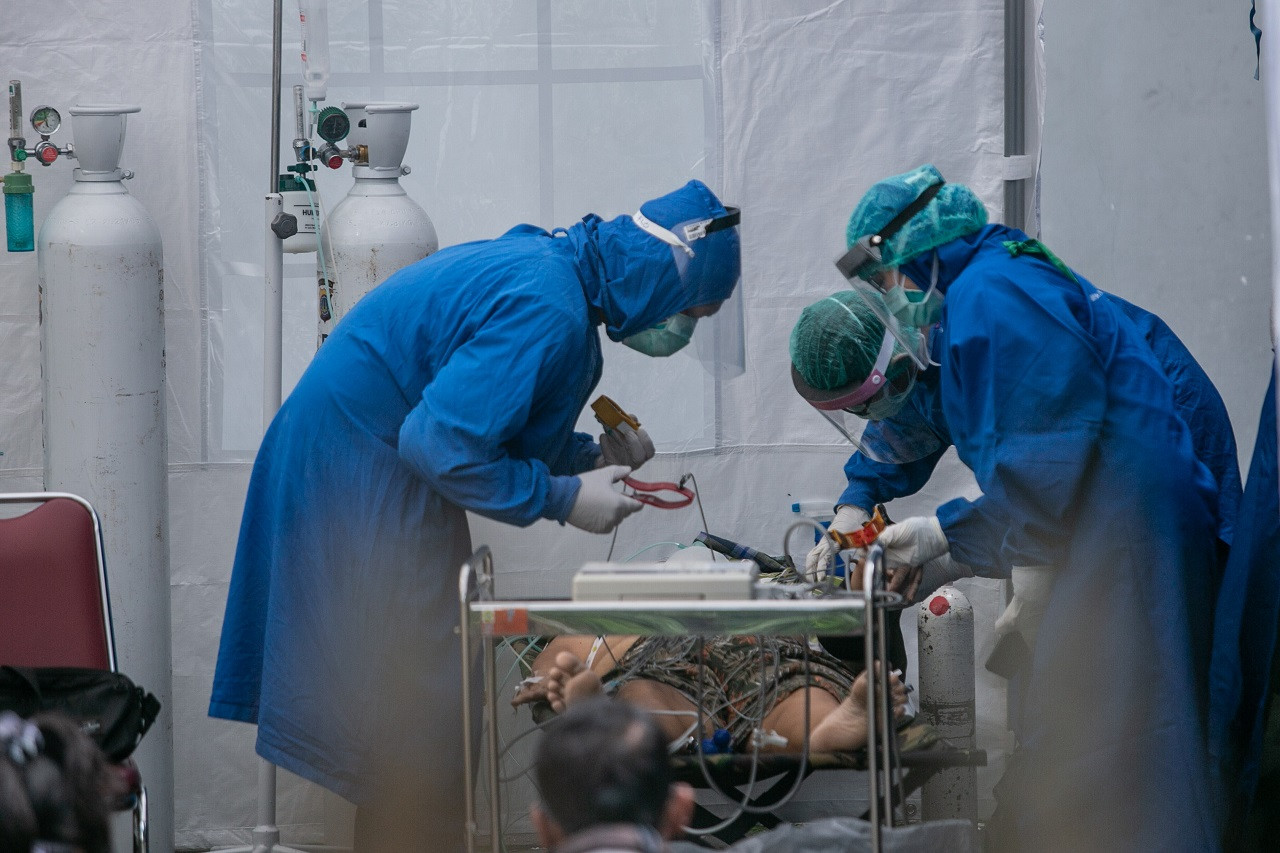Popular Reads
Top Results
Can't find what you're looking for?
View all search resultsPopular Reads
Top Results
Can't find what you're looking for?
View all search resultsToward the digitization of the health systems in Indonesia
A digital healthcare ecosystem will significantly expand access to care, especially for underserved communities in remote, hard-to-reach areas.
Change text size
Gift Premium Articles
to Anyone
T
he global pandemic has accelerated digital transformation in healthcare and spotlighted the urgent need for interoperability among information technology systems facing a deluge of patient data – often fragmented and siloed among various specialties, departments, and sites. Such inefficiencies have cost hospitals over US$300 billion in value every year, according to a McKinsey Global Report.
This year, Philips’ 2022 Future Health Index polled 3,000 healthcare leaders across 15 countries, including Indonesia, and stated that the most pressing issue facing healthcare leaders is staff satisfaction and retention, which become a challenging task in a sector that is facing a widescale labor shortage.
Another pressing priority for healthcare leaders is to continue to expand care delivery beyond hospital walls by investing in technologies such as digital health records, telehealth, and artificial intelligence tools that can enhance efficiency, improve care, and connect remote communities, which can be done by building on advances made during the pandemic.
The report also said that in the next three years, Indonesian healthcare leaders say their top investment priorities will be in both AI (82 percent, up from 38 percent now) and telehealth (49 percent up from 37 percent today). Almost half (47 percent) of Indonesia’s healthcare leaders are investing in digital health records, with another 44 percent prioritizing clinical operations centers.
Both figures are significantly greater than the global average of 39 percent and 22 percent, respectively.
Digitalization is critical in driving the adoption of more sustainable healthcare models. A digital healthcare ecosystem will significantly expand access to care, especially for underserved communities in remote, hard-to-reach areas. Digital solutions are especially scalable, which supports the shift away from sick care to prevention and healthy living. Cost per treatment will also decrease, positively impacting the rising cost of healthcare that many countries around the world are grappling with.
It is with these goals in mind that the government of Indonesia has embarked on a digital transformation of its healthcare system. It recently unveiled a comprehensive digital health blueprint that lays the groundwork for the country to leverage digital healthcare to provide universal, affordable, equitable quality care to all Indonesians. The growth of the digital health ecosystem is also expected to enhance Indonesia’s readiness in facing pandemic and epidemic situations in the future.
Indonesia has 37 provinces from Sabang to Merauke where each province has its unique condition. So, to provide equal access of digital transformation to healthcare professionals and patients across different geographies, the government will have to prioritize development of standardized infrastructures and resources for all of Indonesia.
Additionally, the other main challenge is in the management of national health data. Currently, fragmented data which are spread across varying health sector applications, and standardization and data exchange regulations are the need of the hour. PeduliLindungi app for example currently has more than 95 million users and has the potential to be transformed into a holistic citizen health app.
Currently, the Indonesian government has six pillars of the Indonesian Health system that want to be transformed digitally, which are primary care, secondary care, health system resilience, health financing, health talent and culture, and health digital and technology.
To achieve the vision for a Healthy Indonesia, players across the healthcare ecosystem will need to support and partner with the Health Ministry. The ministry in its digital transformation blueprint has mentioned some of the anticipated challenges in this transformation journey – such as primary care capacity and capability, improving health security and financing system, improving referral care access and quality, enabling development or utilization of tech and human resources.
Private sectors in the health technology industry that have experience in collaborating with and implementing digital transformation journeys for public players across the world, can support the governments by providing their expertise to improve access to care outside Java, improve access to comprehensive care across Indonesia, and a continuum of care for key disease areas, such as cardiology, neurology, and oncology.
For instance, based on previous similar instances across the world at our company, we envision setting up command centers such that four command centers across Indonesia can enable care continuum in cardiology, radiology, digital pathology, and intensive care and address the issue of access and interoperability.
Such command centers can enable seamless access to data and efficient clinical workflows to facilitate collaboration across the cardiovascular teams, between 1 cardiac-focused main hospital and selected middle hospitals. Strategically located command centers can remotely support workflows for oncology, neurology, and others, provide advanced visualization (AV) capabilities and digital computational pathology (DCP) and provide virtual care center.
To support the government in enabling health data interoperability, the health technology companies can help by implementing standardized solutions that would enable healthcare providers to access patient data generated from multi-modality, multi-vendor, multi-hospital, and multi-location visits across any patient’s disease journey.
Going forward, we believe the digital transformation of healthcare and the increasing adoption of virtual care or “telehealth” will play a major role in helping people to live healthily and cope with the disease, and in enabling care providers to meet people’s health needs, deliver better outcomes and improve productivity.
Using the command center hub and spoke model can also help to facilitate remote specialized consultation where one specialist can monitor up to 150 to 200 high acuity patients, while supported by three nurses. Centralized training for healthcare professionals across Indonesia through these hubs can ensure equitable standard of care for all patients.
I can say that our long-term vision is to enable transformations that can extend care beyond the hospital walls. We fully understand the need of integrated informatics solutions that are capable of seamlessly connecting patients and caregivers in real-time, from the hospital to wherever they may be.
Together with the healthcare leaders in Indonesia, we must hand in hand “driving better patient outcomes” to meet people’s health needs, deliver better outcomes and improve productivity.
***
The writer is president director of PT Philips Indonesia Commercial.











